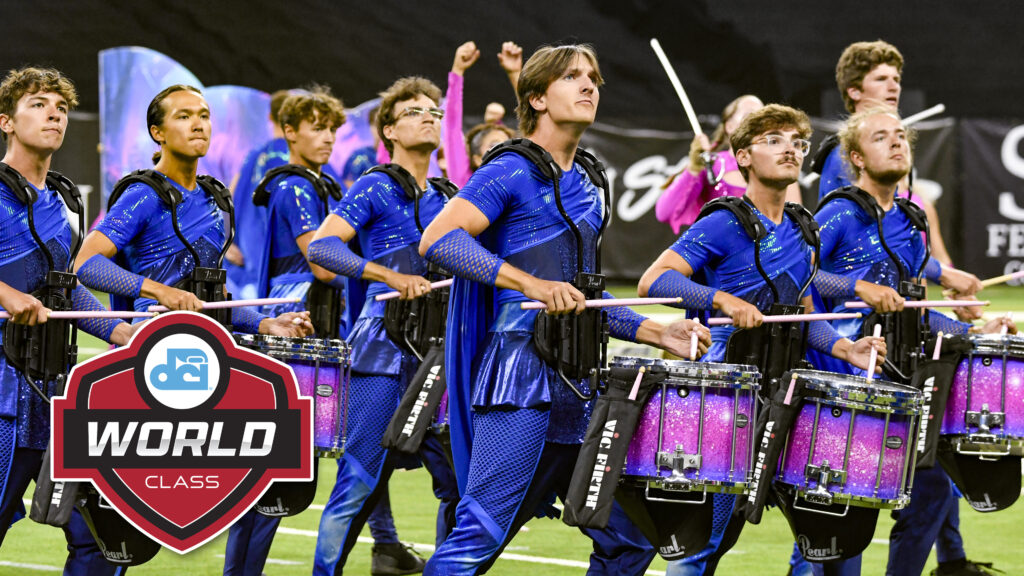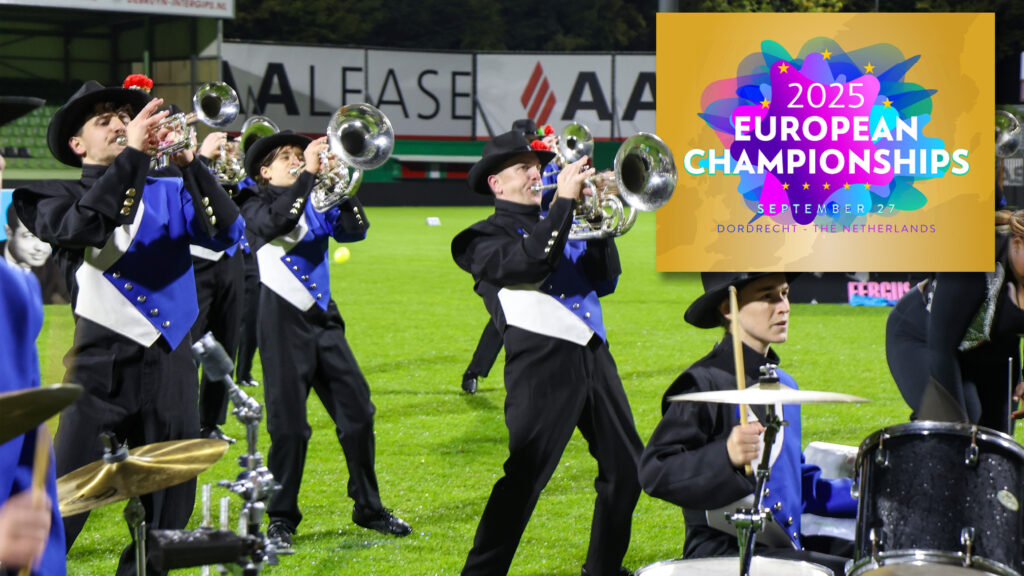Three weeks ago, I had the pleasure of visiting San Diego for the Winter Guard International World Championships. For my money, San Diego not only has the best weather anywhere; it is also the prettiest major city in America: Verdant and green all year round, lots of lovely parks, a natural setting on an ocean with views to die for, and many signs advertising Mexican food. For most of us drum corps fans, much of our year is spent looking at brown vegetation devoid of leaves — the trees and shrubberies shivering through the winter just like our own bodies. Well, the vegetation is now green, the leaves are enjoying their yearly burst of chlorophyll production, and all that can only mean one thing: It’s time for my annual “Spring Cleaning” Fanfare column, where I get to put together snippets of potential columns that relate to each other in no way other than I don’t know what else to do with them. Michael Welge discovered drum corps as a fan in 1984. Three years later, he was transferred to DeKalb, Ill., longtime home to a drum corps show. The next year, he was invited to do miscellaneous staff duties for Guardsmen — equipment, souvie sales, chaperoning and occasional cooking. He claims it was the best three years of his life. He recounts a story that was considered funny at the time. In 1988, the corps picked up “new” buses that were at least a decade old. Unbeknownst to the management, one of the buses had a driver’s seat that was not securely bolted to the floor. According to Mike, “The first time the bus [loaded with kids] drove over a railroad crossing at 30 mph, the seat slipped its track, dumping the driver onto the floor. He hollered and screamed and tried to control the bus without being able to see where he was going. The kids, of course, thought this was a total hoot, regardless of the dangers of the situation. They roared with laughter and couldn’t wait for it to happen again. “Of course, it did happen again and again, regardless of how slowly and carefully the drivers approached each grade crossing, speed bump or pothole. And the drivers, realizing what was probably going to occur, were prepared, and also put on an act for the kids: Screeching and yelling while standing up to drive whenever they hit whatever until the parts were finally located to fix the problem.” Oh, for the return of such innocent times when kids could amuse themselves so easily while adults didn’t have to worry about lawsuits for infractions as simple as a bus driving off a bridge while the driver amused his audience. As potentially embarrassing (and shall we say tragic?) as the above story could have turned out, at least the drivers didn’t lose their pants during the staged episodes of hilarity. Christian Vanbibber was in his first of three years of marching Spirit of Atlanta in 1979. At the DCI Midwest prelims that year, a French horn player’s pants fell down during the show because his suspenders broke. The member, nicknamed Bach, completed the show with one hand on his horn and the other hand holding up his trousers. Bach probably could have added some variety to the scenario had he driven the special effects Guardsmen bus. Doug Oakley wrote in to talk about the history of drum corps and the quality of today’s product. “It never ceases to amaze me that competitors at the highest level, for the most part, have no idea about the history that led up to the current excellence seen on the field. “I have talked to many members, parents, and even corps officers who did not know that in the ’60s and ’70s, corps marched on a field with no markings other than external boundaries and a midline. They also didn’t know that the corps proper had to start outside the field and enter over the left goal line and exit over the right goal line. Nor did they know that the instruments were not much more than Boy Scout bugles with a valve and rotary to change the key. “The list goes on: There were minimum amounts of time that the entire corps had to be in motion, corps were penalized for dropping equipment, the national colors had to be present on the field during the entire performance (with the associated exposure to major penalties) and had to be presented to the judges during the show, and all the percussion had to be carried around the field. That is just a few of the things many current people in drum corps don’t know. “I am the first to say that today’s product is far superior to the corps of my day for a variety of reasons, including technical advances, rules changes, and judging and field changes. While there are some reactionaries who wish DCI would go back to the days of faster-higher-louder, with squads and company fronts, I enjoy today’s corps as much as the corps of my day. But I wish that today’s participants could understand that we wouldn’t have gotten here without having first been there.” Following up on remembering the past, Matt Faust recounts two senior corps from drum corps’ storied history. “Two of the top-ranked, fabulous senior corps — the Reilly Raiders and the Archer-Epler (‘Archie’) Musketeers, both from Philly — competed regularly against each other and Hawthorne Caballeros in the 1950s and ’60s. I was a member of a junior corps from Norristown, Pa., but our instructors were from these senior corps. We would hear about their corps and get to see them in the summer whenever possible. “As an adolescent and high school-age kid, I was exposed to the magical spell that these corps could place you under when they played and marched. It was like a clean drug that gave you such a good feeling that you strove to duplicate it in your own corps. Our instructors held full time jobs during the day and taught us two nights a week, and I believe they taught other corps too. But even as a kid, I could sense the attitude that drum and bugle corps was their passion while working was just something they did to make money for their families. “One of our instructors, Bill Mitten, did eventually become a judge. He was so talented an instructor that he played bugle for Reilly, taught drums to the members of our corps, and provided marching and maneuvering instruction for the competitive winter color guard. I remember a cold New Year’s Day when my mom and dad took our reluctant family siblings down to Philly for the annual Mummers Day Parade. We stood on a crowded corner in South Philly, all bundled up, shivering from the cold and wondering who would want to see a parade in this kind of weather. But we inadvertently shared the space with none other than Mr. Mitten. He made the time pass quickly as he told us his stories and wistfully related how it was that he had had to make a choice in his life … either marching with the Mummers or with Reilly. I was glad that he chose Reilly.” The Fanfare column for April 25, 2003 was titled “Love of Corps Leads to Love in Life.” It told how Garry Parker found his future wife, Jan, through drum corps. The story led to several “Drum Corps as Love Connection” stories over the next several months. Garry, director of the SoCal Dream Senior Corps, wrote back to state, “On Thursday, July 31, Jan and I were married in a small chapel in Las Vegas. She called me the previous Tuesday morning from Chicago (woke me up at 4:15 a.m.) and asked what I was doing Friday. I had to get some paperwork done for a new job, but otherwise the day was free. She asked, ‘You wanna get married?’ “That cleared out the cobwebs, real fast! I responded, ‘Why not?’ “She flew in from Denver on Thursday. I picked her up at McCarran Airport (Las Vegas) at 4 p.m. and we went home to let her change out of her United Airlines uniform. We then grabbed a sandwich and headed out for the jewelry store, where we found a matching set of wedding bands. “We then went to the Marriage License Bureau. Since it was just about 8:30 p.m. when we got the license, we figured, ‘Why not just do it now?’ We had already called a friend who met us at the chapel, so we had a witness. We were married that night at 9:45. “There were definitely some weird coincidences going on that night, too. We kept running into drum corps references. During the ceremony, the music was “Ice Castles” (Madison) and “Music of the Night” (SCV, and the motel next door to the chapel was named Casa Malaga. (We played “Malaga” in SoCal Dream last summer.) “We’ll have to get around to a real honeymoon later as I was starting a new job on Sunday and Jan had to fly to Maui the same day. (I called her there and asked her how our honeymoon was going!) “Anyway, that’s the update for now! Whether we have kids or not is up in the air. Neither one of us is too old, but we’re close! (I have an 18 year-old daughter from a previous marriage, and my 50th birthday is in May 2004.)” Happy 50th Birthday, Garry.
Michael Boo has been involved with drum and bugle corps since 1975, when he marched his first of three seasons with the Cavaliers.
He has a bachelor’s degree in music education and a master’s degree in music theory and composition.
He has written about the drum corps activity for over a quarter century for publications such as Drum Corps World, and presently is involved in a variety of projects for Drum Corps International, including souvenir program books, CD liner notes, DCI Update and Web articles, and other endeavors. Michael currently writes music for a variety of idioms, is a church handbell and vocal choir director, an assistant director of a community band, and a licensed Realtor in the state of Indiana. His other writing projects are for numerous publications, and he has published an honors-winning book on the history of figure skating. His hobbies include TaeKwonDo and hiking the Indiana Dunes. But more than anything, Michael is proud to love drum corps and to be a part of the activity in some small way, chronicling various facets of each season for the enjoyment of others.





